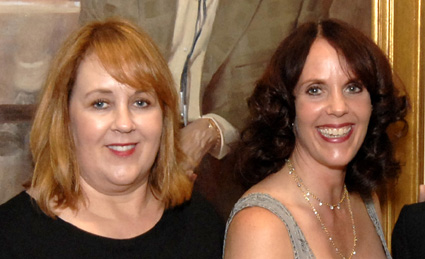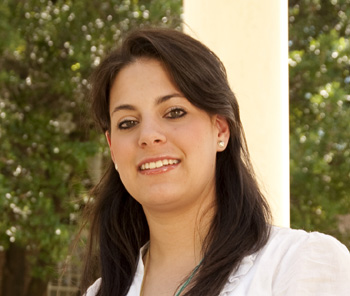The Embrey Human Rights Program:
Life-Changing For Students, Philanthropists
Opportunity, passion and exposure to new ideas bring SMU’s Human Rights Program to life.

It was a combination of opportunity, passion and exposure to new ideas that brought student Adriana Martinez into SMU’s Human Rights Program. The same combination is fueling the philanthropy of Lauren and Gayle Embrey, whose financial gifts have helped turn the study of human rights into one of the fastest growing programs on the SMU campus.
 Gayle and Lauren Embrey |
Lauren and Gayle Embrey will be honored and the Embrey Human Rights Program's new offices celebrated during formal ceremonies Thursday, Sept. 2. The program is moving into new, centralized offices in Clements Hall, providing an academic home for the program and students like Martinez.
The program that started with 39 courses in fall 2007 now offers 70 courses across a wide range of disciplines. Approximately 150 students are in the pipeline to graduate with a human rights minor – including Martinez. It started for her two years ago when she spotted a display for the program at the Hughes-Trigg Student Center and was drawn to the poster announcing program director Rick Halperin’s mantra, “There’s no such thing as a lesser person.”
“Well, then I met Dr. Halperin,” Martinez explains. “I think I was just intrigued by the idea that regardless of what discipline you study, the human rights minor is for you. It centers your focus on the person. It’s not limiting – it opens so many doors.”
One of those doors opened for Lauren Embrey when she traveled with Halperin’s study group to Polish Holocaust sites in December 2005. She returned from the trip determined to share her life-changing experience and, with her sister Gayle, provided $1 million for the first four years of the Embrey Human Rights program, funding student scholarships, travel and course development.
Last March, the Embrey Family Foundation voted to provide $390,000 annually in additional funding for two more years, bringing its total commitment to about $1.8 million in support of the Human Rights Program. The sisters hope to inspire future leaders to be advocates for global human rights by educating young people about the abuses that have existed throughout history and continue today.
 Adriana Martinez |
Martinez finds human rights to be a fit with all four of her majors, political science, public policy, French and history. She says she’s always been interested in politics and was able to arrange several recent meetings with Mexican government officials while spending much of the summer in her family’s home in Mexico City. She is researching regime change as it relates to narcotics trafficking, and she says her human rights studies are helping her to connect some important dots.
“As you start looking at this issue of narcotrafficking, there’s been a natural comparison with Colombia and its militarization. The Human Rights Program has forced me to ask, what human rights are we sacrificing in that kind of strategy?” Martinez says. “ I now feel an obligation to consider that in examining policy options. It’s a security problem, so human rights are not the natural focus.”
Martinez is now working on the Student Leadership Initiative, a student-developed component within the Embrey Human Rights Program that is a hybrid she helped develop between a traditional course and a human rights trip. The first project chosen by the group’s student committee is the study of migration and human rights issues on the U.S.-Mexico border. The students will travel to Tucson, to native American tribal lands that hug the border in the Arizona desert and, potentially, to Mexico during the winter break in January.
“We get to travel and research this,” Martinez says, incredulity creeping into her voice. “Most undergraduates don’t get to do that.”
###
09152-nr-09/01/2010-kc